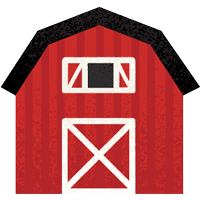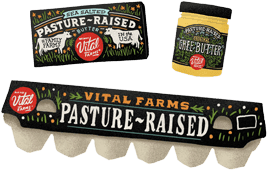At Vital Farms, our mission is to bring ethically produced food to the table. We are committed to serving our stakeholders—farmers and suppliers, crewmembers, communities and the environment, customers and consumers, and stockholders—and treating them as partners. This model guides us far beyond producing pasture-raised foods and challenges us to consider how we can improve the lives of people, animals, and the planet in everything we do.
In 2020, our country faced extraordinary challenges, from the COVID-19 pandemic to a nationwide discourse on race and a myriad of economic hardships, including food insecurity and financial loss. We saw the deep impacts these issues had on many of our stakeholders—whether it was the pressure for our crewmembers, farmers, and retailers to keep grocery shelves stocked, the stress on community food banks to serve an unprecedented number of food insecure families, unforeseen hardships faced by restaurants, or the humble acknowledgment that we at Vital Farms want to do much more to build a diverse, equitable, and inclusive (DEI) world.
Through it all, we remained grounded in our commitment to serve our stakeholders as well as our responsibility to make a positive impact on the world.
We are pleased to share our 2020 Stakeholder Summary, a review of our efforts to serve the stakeholders who so selflessly serve all of us.
2020 By The Numbers
giving 2.5 million hens a life outdoors on pasture
that rejuvenates naturally without herbicides or pesticides
created across the U.S.
to which we made monetary donations, supporting advocacy for animal welfare, environmental conservation, food insecurity, children’s health and development, and ending systemic racism
to food banks across the country
through our new carbon-neutral lid
2020 IMPACT HIGHLIGHTS
Click icons to learn about our impact across each of our stakeholder groups
Our suppliers, who include an invaluable network of over 200 small family farms, are the foundation of our supply chain. We provide meaningful economic opportunities to our farm partners, as well as continuous support through onsite visits and educational resources.
In 2020, we added new family farm partners to our network. Each new partner brings us one step closer to a food system that prioritizes and cares for the many stakeholders involved in food production, including farmers, animals, and the planet.
The more than 200 family farms in our network give approximately 2.5 million hens a life outdoors on pasture with the freedom to roam and forage and include 6,000 acres of land that rejuvenates naturally without herbicides or pesticides.
Additionally, our team made 2,356 farm visits last year to ensure compliance with our animal welfare standards and provide onsite guidance intended to support the health of our farm partners’ flocks.
We believe our growing network of farm partners supports our relentless pursuit of a food system that transitions away from factory farming to ethical, humane food production.
Finally, because we believe in advocating for a food system that treats all animals humanely, we donated to the Humane Society of the United States, Animal Legal Defense Fund, and Humane League as part of our ongoing partnerships with these organizations.
We strive to create a culture that embodies our values to: Be Humble, Lead with a Growth Mindset, Act Like an Owner, and Practice Empathy. We believe in empowering our crewmembers by investing in their financial security, professional development, and overall well-being.
Creating High-Quality Jobs:
We’re always looking for passionate crewmembers to help us fulfill our mission to bring ethical food to the table. We are committed to creating high-quality jobs across the country, including at our headquarters in Austin, TX; at Egg Central Station, our egg washing and packing facility in Springfield, MO; and elsewhere, including for our crewmembers who work remotely. In 2020 we created and filled 49 new positions, building out new competencies and strengthening existing functions across the business.
We provide all crewmembers with generous benefits and competitive compensation, including hourly pay that is at least 25% above the living wage in markets in which we operate (and 75% above minimum wage in Springfield, MO for our crew at Egg Central Station), paid parental leave, retirement contributions, and health insurance.
COVID-19:
This year presented several unforeseen events that affected our crewmembers, including our frontline crew at Egg Central Station, where we wash, pack, and ship our eggs. This crew continues to work through the significant demand to keep families fed throughout the COVID-19 pandemic.
At the onset of and throughout the pandemic, we have taken many measures to support our crewmembers and their families. We implemented several COVID-19 specific measures to protect the health and safety of our crew, including personal protective equipment, daily temperature checks, social distancing, staggered shifts, onsite testing, a strict non-essential visitor policy, and increased sanitation. All crewmembers at our Austin headquarters have worked remotely since March 2020. Read more about our COVID-19 response and safety protocols here.
Diversity, Equity, and Inclusion:
In June, we announced a commitment to addressing systemic racism, which included implementing a series of actions intended to strengthen Diversity, Equity, and Inclusion (DEI) both internally and externally. Our crew-specific actions included commitments to educate ourselves on systemic racism and partner with the National Diversity Council (NDC) to assess and increase diversity across our crew, as well as conducting a review of our crewmember population, compensation, and promotion history to identify any inadvertent inequities in pay and promotion.
Since we began our DEI work, we’ve:
- Hosted “lunch and learns” with our non-profit partners, including Feeding America and Boys & Girls Clubs of America, to learn more about their work to serve communities of color;
- Completed, in partnership with the NDC, an assessment of our compensation and promotion history. While we did not identify any inequities, we will continue to monitor our practices and prioritize maintaining equity regularly;
- Collected data, through direct meetings with our crew and led by NDC, to understand our crewmembers’ unique experiences and needs. To date, we’ve completed a crew-wide survey, conducted 11 focus groups organized by specific demographics, and held one-on-one conversations with key leaders across the company. We also assembled a group of Change Leaders who represent different functions across all levels of the company. With guidance from the NDC, our Change Leaders and leadership team will use the research findings to inform and develop our DEI action plan for 2021.
Our commitment to DEI is ongoing. We plan to report on our progress toward this important initiative in 2021 and beyond.
We have always invested in the communities around us and made decisions as conscious stewards of the environment. This year, as people across the country faced the COVID-19 pandemic and a nationwide focus on racial injustice, our community investments felt more important than ever before.
In 2020, we made monetary donations to 40 non-profit organizations, including Feeding America, No Kid Hungry, NAACP Legal Defense Fund, Boys & Girls Clubs of America, James Beard Foundation Restaurant Relief Fund, Cornucopia Institute, and the Watershed Committee of the Ozarks, that are working to address systemic issues such as food insecurity, environmental conservation, children’s health, and racial injustice, as well as to assist those who were disproportionately affected by the pandemic.
We also donated 15 million eggs, 31,000 pounds of liquid eggs, 29,700 bottles of ghee, and 184,056 Egg Bites to 26 nonprofits, including 21 food banks. A significant portion of these eggs were part of our announced DEI commitment to donate $1 million worth of eggs to food banks serving communities of color.
For our retail customers and the consumers who trust our products, we strive to deliver the transparency and ethically produced food products that we believe is expected of today’s food system.
In January, we launched our Traceability Initiative, allowing consumers to trace their carton back to the farm on which the eggs were laid. To date, our Traceability page has received 225,000 views, demonstrating consumers’ interest in being more connected to the source of their food.
We also introduced our newest ethical food product, Egg Bites, which are made of Vital Farms pasture-raised eggs, pasture-raised cheese, and humanely raised meats.
Additionally, we worked closely with our retail customers, who needed to keep shelves stocked throughout the pandemic, to support them as much as possible, including by doing our best to serve them equally and expedite product to stores.
We began a new chapter as a public company in 2020, and our common stock began trading on the Nasdaq Stock Market on July 31. As one of the few Certified B Corporations and Public Benefit Corporations to go public, we believe we have demonstrated that a business rooted in Conscious Capitalism—prioritizing the long-term benefits of all stakeholders—appeals to public market investors.









